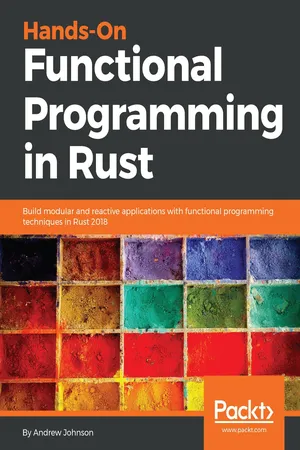
Hands-On Functional Programming in Rust
Build modular and reactive applications with functional programming techniques in Rust 2018
- 249 pages
- English
- ePUB (mobile friendly)
- Available on iOS & Android
Hands-On Functional Programming in Rust
Build modular and reactive applications with functional programming techniques in Rust 2018
About this book
Explore the support Rust offers for creating functional applications in Rust. Learn about various design patterns, implementing concurrency, metaprogramming, and so on in the processAbout This Book• Learn generics, organization, and design patterns in functional programming• Modularize your applications and make them highly reusable and testable using functional design patterns• Get familiar with complex concepts such as metaprogramming, concurrency, and immutabilityWho This Book Is ForThis book is for Rust developers who are comfortable with the language and now want to improve their coding abilities by learning advanced functional techniques to enhance their skillset and create robust and testable apps.What You Will Learn• How Rust supports the use of basic functional programming principles• Use functional programming to handle concurrency with elegance• Read and interpret complex type signatures for types and functions• Implement powerful abstractions using meta programming in Rust• Create quality code formulaically using Rust's functional design patterns• Master Rust's complex ownership mechanisms particularly for mutabilityIn DetailFunctional programming allows developers to divide programs into smaller, reusable components that ease the creation, testing, and maintenance of software as a whole. Combined with the power of Rust, you can develop robust and scalable applications that fulfill modern day software requirements. This book will help you discover all the Rust features that can be used to build software in a functional way.We begin with a brief comparison of the functional and object-oriented approach to different problems and patterns. We then quickly look at the patterns of control flow, data the abstractions of these unique to functional programming. The next part covers how to create functional apps in Rust; mutability and ownership, which are exclusive to Rust, are also discussed. Pure functions are examined next and you'll master closures, their various types, and currying. We also look at implementing concurrency through functional design principles and metaprogramming using macros. Finally, we look at best practices for debugging and optimization. By the end of the book, you will be familiar with the functional approach of programming and will be able to use these techniques on a daily basis.Style and approachStep-by-step guide covering advanced concepts and building functional applications in Rust
Tools to learn more effectively

Saving Books

Keyword Search

Annotating Text

Listen to it instead
Information
Performance, Debugging, and Metaprogramming
- Recognizing and applying good performant code practices
- Diagnosing and improving performance bottlenecks
- Recognizing and applying good defensive coding practices
- Diagnosing and resolving software bugs
- Recognizing and applying metaprogramming techniques
Technical requirements
Writing faster code
Compiling with release mode
- Rust normally compiles in debug mode, which is slow:
cargo build - Rust optionally compiles in release mode, which is fast:
cargo build --release - Here is a comparison using debug mode for a toy program:
$ time performance_release_mode
real 0m13.424s
user 0m13.406s
sys 0m0.010s
- The following is the release mode:
$ time ./performance_release_mode
real 0m0.316s
user 0m0.309s
sys 0m0.005s
Doing less work
extern crate flame;
use std::fs::File;
fn main() {
let v: Vec<u64> = vec![2; 1000000];
flame::start("Iterator .collect");
let mut _z = vec![];
for _ in 0..1000 {
_z = v.iter().map(|x| x*x).collect::<Vec<u64>>();
}
flame::end("Iterator .collect");
flame::start("Iterator iterate");
for _ in 0..1000 {
v.iter().map(|x| x * x).for_each(drop);
}
flame::end("Iterator iterate");
flame::dump_html(&mut File::create("flame-graph.html").unwrap()).unwrap();
}
use std::mem::forget;
fn main() {
for _ in 0..10000 {
let mut a = vec![2; 10000000];
a[2] = 2;
forget(a);
}
}
Table of contents
- Title Page
- Copyright and Credits
- Packt Upsell
- Contributors
- Preface
- Functional Programming – a Comparison
- Functional Control Flow
- Functional Data Structures
- Generics and Polymorphism
- Code Organization and Application Architecture
- Mutability, Ownership, and Pure Functions
- Design Patterns
- Implementing Concurrency
- Performance, Debugging, and Metaprogramming
- Assessments
- Other Books You May Enjoy
Frequently asked questions
- Essential is ideal for learners and professionals who enjoy exploring a wide range of subjects. Access the Essential Library with 800,000+ trusted titles and best-sellers across business, personal growth, and the humanities. Includes unlimited reading time and Standard Read Aloud voice.
- Complete: Perfect for advanced learners and researchers needing full, unrestricted access. Unlock 1.4M+ books across hundreds of subjects, including academic and specialized titles. The Complete Plan also includes advanced features like Premium Read Aloud and Research Assistant.
Please note we cannot support devices running on iOS 13 and Android 7 or earlier. Learn more about using the app